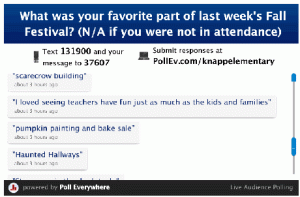One Size Does Not Fit All: Engaging Families Next Year by Soliciting Feedback Now
Your content has been saved!
Go to My Saved Content.As we near the end of the school year, it's time to take stock of our efforts in teaching, learning and leadership, and how well they’ve worked. We should also be looking at what has or has not worked in regards to engaging all of the families in our school community.
How to Engage Parents
Recently, Kansas City parents completed a comprehensive survey, with two key points made throughout the data collected:
- Parents have different visions and priorities when it comes to being an "involved parent."
- School leaders must tailor their approaches to more effectively engage parents in school improvement.
- Two-way communication should be the default. Clear communication from educators on academic expectations, school policies and resources is important, but parents must also have the opportunity to bring their perspectives to the table.
- Start by listening to and addressing key concerns. School leaders should identify the pressing concerns of parents to gain an understanding of how they think and talk about them. When parents know their chief concerns are being addressed, they are the most open to constructive involvement.
- Approach parents with a clear request. Nearly one-quarter of parents surveyed say they haven't been asked to volunteer or help out at their children's schools in the past year. If school leaders want parent help, they should ask for it directly.
- Provide many and varied opportunities to engage. When school leaders provide diverse opportunities for parental involvement, they have a greater chance of attracting parents of differing views and readiness.
Consider the Data
While the research, underwritten by the Ewing Marion Kauffman Foundation, explores the views of Kansas City parents, it also echoes findings from a previous Public Agenda national study and raises important questions for education leaders nationwide.
Just over half (51%) of the Kansas City region's parents acknowledge that they could be more involved at their child's school if they tried harder, though parents are divided on how they prefer to be involved. Many parents (27%) say they could help out more in traditional ways at the schools their children attend, and nearly a third (31%) seem ready to embrace broader roles in shaping how schools operate and advocating for policy reform. Some parents (19%) are primarily looking for more guidance from their schools on how to help their own children succeed.
"This collection of data suggests that most parents are still an untapped resource for improving and reimagining public schools. School leaders are missing the mark in their efforts to engage parents if they don't focus on parents' distinct priorities, concerns and unique strengths," says Carolin Hagelskamp, director of research at Public Agenda. "We believe school leaders can improve their success in this area by tailoring their approaches more effectively."
Overall, parents surveyed are supportive of their principals and teachers. Over three quarters (77%) say the principals and teachers at their child's school are connected to the community and have a good feel for what's going on there. Almost two thirds (64%) say their school goes out of its way to encourage parents to get involved.
Many parents surveyed lack knowledge about important school issues. Nearly four in ten (37%) do not feel well-informed about where their child's school ranks academically compared to other area schools. Only 40% of parents say they know "a lot" about their children's teachers, and one quarter are unsure whether or not their child's school made "adequate yearly progress" the year before.
Transformers, Helpers and Help-Seekers
The study identified three distinct groups of parents:
- Potential Transformers are poised for deeper action on education policy, though still on the sidelines. These parents say they would feel "very comfortable" serving on committees to decide school policies and advocating for school improvements by contacting public officials and the media. However, very few have been involved in these ways. Of parents surveyed, 31% fall into this group.
- School Helpers are willing to get more involved in traditional ways. These parents are less comfortable with advocacy roles but say they could be more involved helping out directly at their children's schools. School helpers say they feel "very comfortable" participating in traditional involvement activities, including volunteering for school trips, bake sales or sporting events, or attending PTA meetings. This group includes 27% of parents surveyed.
- Help-Seekers are concerned about their children's learning and are primarily looking for more guidance from their schools. These parents are unlikely advocates, as they feel they are already doing as much as they possibly can at their children's school. Yet all help-seekers feel they still haven't succeeded in helping their children to do their best in school. At the same time, this group is more critical than other parents of their teachers and schools, and more skeptical about most initiatives to improve parental involvement. Of parents surveyed, 19% fall in this group.
Kansas City Schools have taken a very important step in soliciting comprehensive feedback from their families about how they are currently engaged and how they would like to be engaged in their children's schooling. Now comes the most important part in the process: how much of this feedback will be used to reform family engagement efforts, and most importantly training, professional development and university coursework in the area of engaging families?

Next Steps
Looking for a comprehensive survey tool to use with your families before the school year is up? Check out this new PreK-12 Harvard Graduate School of Education Survey Monkey Template. We recently sent it out to our 600 families at Knapp Elementary for a one-month data collection process. Once the results are in from online and hard copy offerings, parents and teachers from our family engagement team will sit down this summer to identify strengths and weaknesses prior to drafting our 2013-14 school year family engagement goals. Finally, our first Home & School Meeting will detail the findings and goals put in place.
